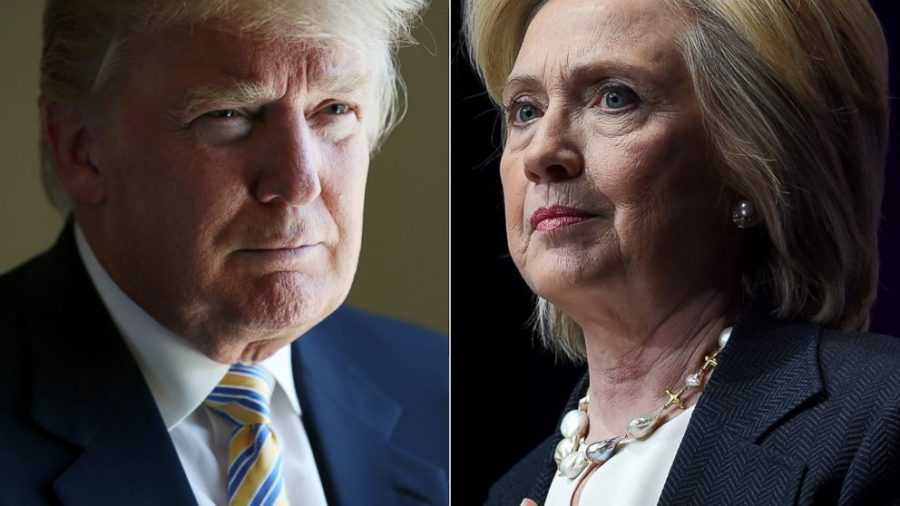Trump and Hillary: On the Issues
More stories from Gabe Geytsman
| Hillary Clinton | Donald Trump |
|---|---|
| Foreign Policy: Hillary Clinton is hesitant to depart from ivory tower foreign policy prescriptions. She favors moderate intervention against the governments of nations who do not align with the US, such as Assad in Syria or in the Ukrainian conflict. She does not support boots on the ground, however, against terrorist forces in the Middle East. She regrets her vote in support of the Iraq war, which she blames on the information provided by the intelligence community. Clinton has previously expressed pride over the deposing of Libyan dictator Muammar Qaddafi, a move that has been met with both support and criticism.
********************************************* |
Foreign Policy: Donald Trump is eager to depart from mainstream foreign policy wisdom. His chumminess with Russian President Vladimir Putin is well known and often criticized. He seeks to end America’s role as world policeman and allow Syria and Ukraine to fall back in to Russian geopolitical orbit. Trump claims to have opposed the Iraq war in the early 2000s; sources have surfaced that both support and contradict this. Trump has advocated for pressuring US allies to pay for their own defense, accusing allies of not fulfilling their defense spending requirements and being a drain on the US.
******************************************** |
| Economy: Clinton’s position on key issues such as free trade is muddled. Despite once calling the Trans-Pacific Partnership a paragon of trade deals, during the primaries her opponent Bernie Sanders’ vociferous opposition to the trade deal that would strip American jobs and sovereignty convinced Clinton’s policy advisers that opposition was more popular and thus it became her stance. At large, Clinton supports free trade, which economists argue is good for the economy.
********************************************* |
Economy: Donald Trump has been an opponent of free trade before Clinton, citing both NAFTA and the TPP as trade deals that hurt American industry. He advocates tariffs against countries which allegedly siphon off American manufacturing jobs, but some construe these tariffs as threats with which to rattle China and start a trade war. Economic analysts agree that tariffs hurt the economy.
******************************************** |
| Immigration: Hillary Clinton is in favor of traditional liberal immigration policy, with some form of amnesty for illegal immigrants, an increase in the acceptance of Syrian refugees, and does not support increased border control or a wall on the border. She would uphold Obama’s immigration executive action which helps illegal immigrants attain citizenship and avoid deportation. Democratic economists argue that immigrants, legal and illegal, are good for the economy.
********************************************* |
Immigration: Donald Trump is a vociferous opponent of the immigration of certain groups of people who he believes are not in the interest of the American people. He has supported a ban on Muslims in the past from which he has retreated. He supports the deportation of illegal immigrants, at the very least criminals, and if possible, all of them. He opposes the intake of Syrian refugees. Republicans argue that refugees and illegal immigrants are a net drain on government funds.
******************************************** |
| Minimum Wage: Clinton favors a moderate increase in the minimum wage, which she calls a living wage. Economists caution, without unanimity albeit, that minimum wage hurts workers.
********************************************* |
Minimum Wage: Donald Trump, at one of the Republican debates, wanted to keep the minimum wage as is, which drew criticism. However, as part of his appeal to more moderate voters, he claims to be willing to increase the minimum wage. Economists caution, without unanimity albeit, that minimum wage hurts workers.
******************************************** |
| Drugs: Neither candidate has been vocal on this issue. Clinton, however, intends to legalize medical marijuana, while deciding to evaluate the legalization of recreational marijuana at a later time. She views opioid addiction as an epidemic, pledging 1 billion dollars as President to alleviate it.
|
Drugs: Neither candidate has been vocal on this issue. Trump agrees with Clinton, intending to legalize medical marijuana, while remaining indecisive on recreational marijuana. Trump preaches “no drugs, no alcohol, no cigarettes” as a mantra for himself and his children. |

